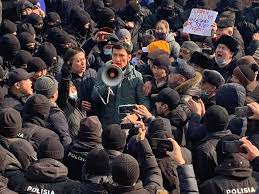
The Washington Post today reported that Kazakhstan has been upbraided by the United Nations for misusing the blue helmets of UN Peacekeeper’s – this follows reports that the Kazakh leader Kassym-Jomart Tokayev, ordered troops to “shoot to kill” demonstrators without warning
U.N. rebukes Kazakhstan after troops spotted wearing blue peacekeeping helmets while policing protests
Amy Cheng 1-11-22 WASHINGTON POST
The United Nations has rebuked Kazakhstan after the Central Asian country’s troops were spotted wearing blue helmets reserved for U.N. peacekeepers during a violent crackdown on protesters last week.
Stéphane Dujarric, a spokesman for the U.N. Secretary General, told reporters Monday that Kazakh authorities had said they would address the issue after the global body raised concerns. “Countries are to use U.N. insignia only when they are performing their mandated tasks as U.N. peacekeepers in the context of their deployment within a U.N. peacekeeping operation,” he said.
Blue helmets have become a symbol of the U.N.’s peacekeeping efforts since the 1950s. Kazakh authorities could have been attempting to portray the country’s security forces as “representing a more international action” in an “attempt to draw on the unique legitimacy” that U.N. peacekeepers possess, said Charles Hunt, an international security expert at RMIT University in Australia.
Kazakhstan’s President Kassym-Jomart Tokayev, who ordered his security forces to “shoot to kill” demonstrators without warning, has tried to portray the protesters as foreign-backed “trained” terrorists attempting a coup. He has not presented substantive evidence to support his claim, though Tokayev has reestablished control of the country after inviting in a Russian-led military alliance to help him control the unrest. Russia has frequently deployed “peacekeepers” for extended periods to countries that Moscow fears are slipping out of its sphere of influence, often against the wishes of local leaders.
The protests that broke out in early January in Central Asia’s largest economy were initially directed against a drastic fuel-price hike, before drawing in people with grievances against Kazakhstan’s sclerotic and autocratic political system. Many of the demonstrations were peaceful, but they spilled over into other parts of the country and became particularly bloody in Almaty, Kazakhstan’s largest city, where government buildings and cars were torched.
At least 164 people have died in the upheaval, according to government officials, and some 9,900 have been detained, Russian news agency RIA reported Tuesday.
Kazakhstan’s ambassador to the United Nations said in a tweet that the pictured troops were members of a Ministry of Defense peacekeeping unit and had been deployed to protect infrastructure. Apart from the headgear, no other U.N.-marked equipment was used, he said.
(Tokayev, the Kazakh president, served as a top U.N. official in Geneva from 2011 to 2013. Upon his appointment to the post, he was characterized as having “thorough knowledge” on disarmament issues and “extensive” management experience.)
It is plausible but not convincing that the Kazakh service members wore the U.N. helmets because they were the only headgear readily available, said Hunt, the Australia-based expert.
Under international law, the improper use of equipment bearing U.N. symbols in an international armed conflict could constitute a war crime. But Hunt said the law is not likely to be applicable in Kazakhstan since the bloody clashes are primarily a domestic affair.
The U.N. Department of Peace Operations and Kazakhstan’s Defense Ministry did not immediately return requests for comment.
Whatever the intentions of the country’s authorities, Kazakh troops wearing U.N. helmets might jeopardize the reputation and safety of authorized peacekeepers if they were culpable of rights violations, Hunt said.


